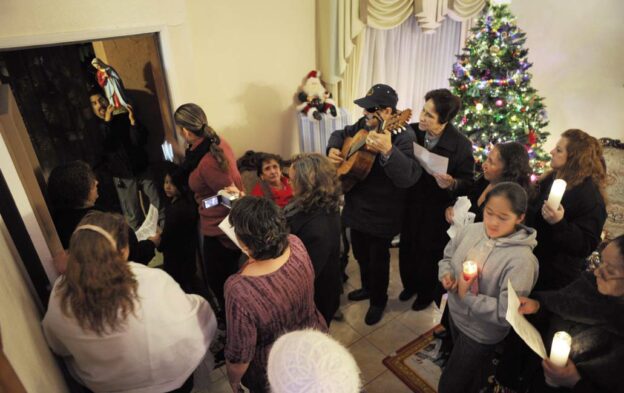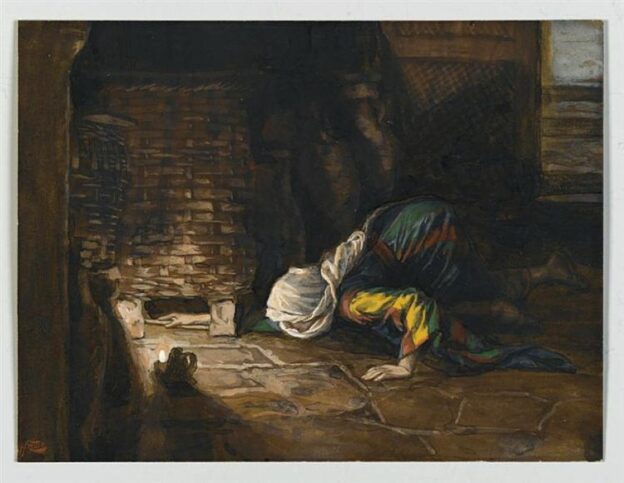We’re looking at the book of Philippians through the lens of joy. Joy does not come easily, and I need to be reminded of the choices and attitudes that lead to joy. Too many times I settle for happy – which is a cheap substitute for joy. The road to joy is hard. If we are going to walk it, it will require ongoing transformation into God’s likeness. Think about over themes in Philippians – humility, unity over preference, a servant attitude. This is very different from what culture says leads to joy – vacations, holidays, or career success.
And so we have a decision to make – are we going to believe Paul? Today we encounter two men, Timothy and Epaphroditus, who have chosen to believe what Paul has taught them about joy. They don’t just believe it, they are putting into action the things they’ve learned. Their stories serve as perfect examples of how serving well leads to joy.
My husband Chris and I had a funny experience with this a few years ago when we made a trip into Atlanta to see a performance of Cirque de Soleil. We left our three boys with their grandparents and we traveled into the big city to eat a great meal and see the show. Cirque de Soleil is amazing! It’s not just a circus. It’s a fancy French circus – acrobatics, balancing, launching people on teeter totters, all set to music. It is totally captivating. At one point in the show, I leaned over to my husband and whispered, “We have to bring the boys next year. They will love it!” But we both at the same time quickly said, “Oh no, that’s a bad idea.” Chris and I sat through that whole show and never once thought “I bet I can do that…” My boys, however, would have sat through Cirque de Soleil as if it had been a training seminar. And we would have spent the next year in the Emergency Room.
While setting examples might be dangerous at the circus, it is exactly what we should do when it comes to the Bible. We should be reading and thinking, “I can do that! I’m going to try it!” Instead, I often read and think, “How interesting! Isn’t Paul amazing?” while instead I should be thinking, “I’m going to try that.” James 1:22 says “Do not merely listen to the word, and so deceive yourselves. Do what it says.” We are called to listen to the word and to do what it says.
We are supposed to read and think, “I want to learn how to do that.” In this case, Timothy and Epaphroditus show us what it looks like to adopt these attitudes that Paul is writing about to the Philippians. In the last part of Philippians 2:19-30, Paul shows us that real, live people can do what he is talking about:
I hope in the Lord Jesus to send Timothy to you soon, that I also may be cheered when I receive news about you. I have no one else like him, who will show genuine concern for your welfare.For everyone looks out for their own interests, not those of Jesus Christ. But you know that Timothy has proved himself, because as a son with his father, he has served with me in the work of the gospel.I hope, therefore, to send him as soon as I see how things go with me. And I am confident in the Lord that I myself will come soon.
But I think it is necessary to send back to you Epaphroditus, my brother, co-worker and fellow soldier, who is also your messenger, whom you sent to take care of my needs. For he longs for all of you and is distressed because you heard he was ill.Indeed he was ill, and almost died. But God had mercy on him, and not on him only but also on me, to spare me sorrow upon sorrow. Therefore I am all the more eager to send him, so that when you see him again you may be glad and I may have less anxiety. So then, welcome him in the Lord with great joy, and honor people like him, because he almost died for the work of Christ. He risked his life to make up for the help you yourselves could not give me.
Let’s start by looking at Timothy.
Paul is writing this letter from prison while he is awaiting his trial. He will soon find out if he will be released or executed. While he is in prison, Timothy has been partnering with Paul so that the work of church planting and church supporting can continue. Paul now plans to send Timothy to Philippi so that he can be helpful to them and give Paul a full report of how they are doing.
Paul in describing Timothy says, “I have no one else like him.” That’s quite a compliment. Paul then goes on to describe what is so outstanding about Timothy. The first thing he mentions in verse 20 is that Timothy has taken a “genuine interest in their welfare.” Timothy genuinely cares how the church at Philippi is doing. Timothy isn’t pretending or posing as someone who cares. He really cares. The word genuine can also be translated as “natural” or a trait that comes through “birthright.” The things about us that we just can’t help – our eye color, our hair texture. We can’t change those things. They are an expression of our DNA. Those things are our natural state. Timothy cares about this church because his Father God cares about them. It is being expressed through his spiritual DNA – from the inside out. He can’t help it.
God is forming Timothy into someone who can’t help but care for others. That is the work of God in his life. This is what God does when we let him: God changes us from the inside out. So we don’t have to pretend to be holy. We can be holy – because it is in our DNA.
Does your service, like Timothy’s, come from a genuine interest in others? If we are going to put into action what the letter to the Philippians describes, we need to start asking ourselves some questions. How are we doing in this area? Do you have a genuine interest in others?
Genuinely caring about others is hard. It means we will have to feel things. We will have to experience disappointment when people we care about make bad choices. It means we will have to hurt with people and to wait with people and to get frustrated by people.
I know this is happening throughout the church. Many people are genuinely touched by the needs of those you serve – their physical needs, their emotional well-being, the spiritual roadblocks they are experiencing. Be encouraged. If it hurts sometimes, you are doing it right. If you get so frustrated you want to quit sometimes, you are doing it right. If sin and brokenness breaks your heart and makes you want to hit something, you are serving well. And if you’ve found yourself at a point where you are numb or having a hard time letting those you serve get close to your heart, spend some time talking with God about that. Paul is showing us through Timothy’s example that showing genuine interest in others is the path that leads to joy.
The next thing Paul tells us about Timothy is that he works like a son, not an employee. We read in verse 22, “Timothy has proved himself, because as a son with his father he has served with me in the work of the gospel.” I have never worked for a business my family-owned, but I’m guessing it’s different than just showing up for a job. When you are the son or daughter going to work you know that what you do affects not just your income but your inheritance.
A few weeks ago we ended up in a different town at lunch time and stopped at a pizza place called Michelle’s. After our waiter took our order, I asked him who Michelle was. He said, “oh, she’s the owner’s daughter, over there.” And he pointed to one of the waitresses. As we waited for our food, I watched her work. She waited tables – like she owned the place. She was engaged with the customers, she knew the menu, she obviously cared about each person’s experience. She was working like a daughter and not just an employee.
Timothy considered God’s Kingdom his family business and he worked in it like a son. I’m not saying that he overworked; the sense I get is that he fully invested himself in kingdom work. He didn’t hold back.
Do you approach kingdom work as a son or daughter or like an employee? Do you approach your work in the kingdom like you are working in your family’s business? I’m talking about how we approach kingdom work in all areas of our lives: the way we interact at work and school and in our community. Do we have areas of our lives that we engage as children of the kingdom and others where we forget who we are?
There is a cost to working like a son or daughter. We let God’s way invade every aspect of our lives – we care not just about doing our assigned tasks but about the long-term vision of God’s work in the world. Again, I’m not talking about overwork or saying “yes” anytime someone asks you to serve. Rather, I’m talking about seeing yourself as a co-owner in God’s work. What that looks like will be different for everyone. Paul is showing us through Timothy’s example that working like a son or daughter is a joyful way to serve. It brings a deep sense of satisfaction and purpose that lasts.
Now we get to Epaphroditus (E-paf-roe-DIE-tus). If anyone ever needed a nickname, it’s him!
Epaphroditus was a member of the church at Philippi who was selected by the group to hand deliver a gift to Paul. We don’t know the details but it seems like they collected items that he needed while in prison – clothing, food, medicines, supplies, probably money.
At that time UPS didn’t deliver between Philippi and Rome, so someone needed to make the trip and deliver it in person. Epaphroditus was chosen for the mission and it proved to be dangerous; he literally risked his life. We read in verse 30, “he almost died for the work of Christ, risking his life to make up for the help you could not give me.” The trip was long. I “Google mapped” the route. To walk from Philippi to Rome would take about 219 hours. If he walked eight hours a day it would have taken 27 days one-way. There also would’ve been a boat ride across the Adriatic sea. Then once Epaphroditus arrived in Rome he got to hang out in a prison. And Rome wasn’t safe for Christians. Neither was associating with someone already in trouble for spreading the gospel. Somewhere along the way, Epaphroditus got very sick with a serious illness. Paul says he almost died and that only God’s intervention saved Epaphroditus’ life. What else might it have cost Epaphroditus to make this trip – time away from his family and community, his own career and work, whatever his own personal ambitions and priorities were?
What are we risking? Not many of us will be called to risk our physical lives. But we may be called to risk the life we thought we would have. We may be asked to risk our priorities and plans. We may be asked to risk our comfort and safety. But when it starts to pinch and pull at “our best life” we start to get nervous. When the Spirit begins to tug at our safety nets and the things we cling to for security, when God exposes the things we do to avoid pain. It defies all logic: but risking everything is where we can find joy.
Paul’s hope is that we will discover the path to joy that he knows. And he knows that we cannot have joy when we aren’t willing to genuinely care for others, when we treat God’s kingdom like a dead-end job, or when we aren’t willing to risk anything.
This question seems to sum up the path to joyful service in God’s kingdom…are you concerned with the interests of others? Paul repeatedly takes notice not just of what people do but why they are doing it. We can do good things for the wrong reasons. We can serve at church, build houses for the poor, excel at school all for the wrong reasons. It’s an example of grace, that God uses us even with our mess of motivations to accomplish Kingdom work. But if we want to serve in a way that leads to joy we need to let the Spirit work at a deeper level – at the level of our motivations.
Here are a couple of ways we can invite the Holy Spirit to begin working on our motivations:
1. Ask God to make you more self-aware.
Ask God to show you what your true motivations really are. The human heart is complex and multi-layered. In spiritual direction, we dive into these layers with why questions.
“I want to serve.”
“Why?”
“Because I want to help others.”
“Why?”
Sometimes the why is to glorify God. Other times the why beneath that why is because we want to feel good about ourselves, soothe our guilt, or boost our reputation.
In Psalm 139, David asks God to “search him and know him.” Picture God walking through your heart with a flashlight, pointing in the dark corners and lovingly pointing out the truth of what’s there. God knows all there is to know about our motives. God can see into the deep places of our hearts that we don’t even know are there. Ask him to show you what is there.
2. Give God permission to work.
The second action is to give God permission to work. When God shines a flashlight on something lurking in the basement of your heart, surrender the corner. Writing to the Roman Christians, in 6:13 Paul encouraged them to follow sacrificial living as, he said, we “offer ourselves to God.” You may think God only wants the good parts. But what if I offer the parts that I need God’s help with? Open the door to that spot in your heart and give God permission to work.
3. Waiton God.
The third step is to wait. Isaiah describes us as clay in the potter’s hands. We wait while God forms us. Our instinct is to come out fighting: “oh, I have pride, I will single-handedly eradicate pride from my life.” No, you won’t. And if you could, you’d be prideful about it. Our work instead is to surrender and wait. But we wait with expectation: “He who began a good work in you will complete it.”
God is calling us not just to do good things, but to do them for the right reasons – with others’ interests at heart. To do them out of love for Christ and his people. To do them because our hearts are touched by the effects of sin and brokenness and poverty and injustice. Then our service will go from draining to life-giving, from drudgery to joy-producing. When I am feeling run down it is usually a result of one or two things: I’m not taking enough time in God’s presence, or I’m serving from wrong motives. I’m seeking my own interests over those of others.
What are the signs of this?
– I begin to feel unappreciated. I begin to think back to the last time I was thanked or complimented.
– I begin to let resentment simmer just under the surface. Everything becomes irritating and frustrating.
– I am tempted to see people as cogs in the wheels of my machine. I begin to fantasize about how great everything would be if people just cooperated with my plans.
– I begin to see everything as unfair. That person isn’t caring enough, or that person isn’t contributing enough.
When I find myself in that place, the choice is mine. And the choice is ours. Will we believe what Paul is telling us about joy? Will we find Timothy and Epaphroditus’ examples merely interesting and admirable, or will we say, “I can do that”?











